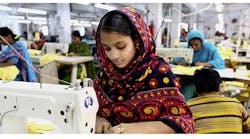New international standards to protect those working in global supply chains, was made at the International Labour Conference (ILC) in Geneva on June 10.
“The ILC has recommended – and empowered – this vital UN body, the ILO, to act to protect countless workers worldwide,” said ITF (International Transport Workers’ Federation) general secretary Steve Cotton. “Currently many of them are defenseless, victimized and exploited, as the shocking recent investigations into slavery in the fisheries sector have shown. For others conditions and job security range from good to near zero. This breakthrough move could lead to protections as positive and inclusive as the ILO’s Maritime Labour Convention 2006.
“We need accountability and governance, particularly from the ‘economic employer’, the lead firm in the supply chain," Cotton added. "We need standards that apply wherever the supply chain reaches. There can be no excuses, no exemptions, no blaming abuses on the local management just because it’s a subcontractor or far from the home country.”
Under the program of action, the plan of action specifies that the ILO should:
(a) Promote the ratification and implementation of the ILO standards relevant to decent work in global supply chains.
(b) Strengthen capacity building and provide technical assistance to member States on labour administration and inspection systems. These actions should also ensure that workers have access to legal remedies, including in EPZs. The ILO should continue to support efforts by governments to improve the rule of law and facilitate the transition from the informal to the formal economy, establishing independent and effective judicial systems, improving implementation and enforcement of national law, and building the capacity of all enterprises to comply with national law.
(c) Promote effective national and cross-border social dialogue, thereby respecting the autonomy of the social partners. When social partners decide to negotiate international framework agreements, the ILO could support and facilitate the process, on joint request, and assist in the follow-up process, including monitoring, mediation and dispute settlement where appropriate. Furthermore, the ILO should undertake research on the effectiveness and impact of cross-border social dialogue.
(d) Assess the impact and scalability of, and where necessary, adapt and scale up development cooperation programs, such as Better Work and Sustaining Competitive and Responsible Enterprises (SCORE), and develop sectoral and other approaches to address decent work challenges in global supply chains.
(e) Provide leadership and use the ILO’s convening power and unique added value to drive policy coherence among all multilateral initiatives and processes related to decent work in global supply chains.
(f) Strengthen its capacity to give guidance to enterprises on the application of labor standards within their supply chains and make information available on specific country situations, laws and regulations, including on the implementation of labor rights due diligence in coherence with already existing international frameworks.
ITF president Paddy Crumlin commented: “This is an important breakthrough on accountability. The investigative work by the trade union movement and journalists that has exposed near slavery and child labour in supply chains is an appalling indictment of some corporate behaviour and regulatory negligence. Less extreme, but also wholly unacceptable, is the race to the bottom dictated by many firms at the top of supply chains, leading to low wages, low protections, long hours and dangerous conditions, harassment, effective invisibility and an undermining of all that an employee/employer relationship must stand for legally, as well as morally
ITUC (International Trade Union Confederation) general secretary Sharan Burrow stated: “Transparency, responsibility and accountability need to be associated with global supply chains, not unsafe, insecure low wage work. The ITUC recently found a hidden workforce of 116 million workers in the global supply chains of just 50 multinational companies, or 94% of their total supplier workforce, with most companies failing to accept responsibility for a minimum living wage, job security or decent working conditions.”



